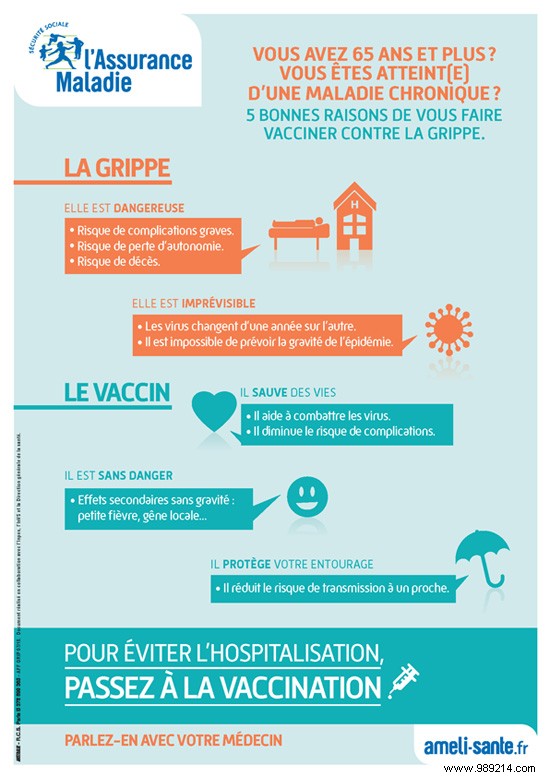
It seems obvious that the 2009 influenza A (H1N1) left its mark, not from a pathological point of view but in terms of the negative image that now sticks to vaccination.
A survey earlier this week announces that 70% of French people have no intention of getting vaccinated against the flu this year. The reasons given are uselessness for 52% and the risk incurred for 22%. It must be said that last winter, the vaccine was only 30% effective because of the wrong strain it contained...
Suddenly, as if the public authorities came to support the pharmaceutical industry, the health insurance launched a com campaign in favor of this vaccination, relayed by television spots which give the floor to the hosts of France Télévisions (curious!. ..):"Influenza:to avoid hospitalization, go to vaccination"... And that's not all, the French said to be "at risk", that is to say aged over 65 or suffering from specific diseases, will receive a personalized letter, sesame to get vaccinated for free:that still represents 10 million people!
The Institute for Health Surveillance (InVS) counted, last year, 18,300 deaths due to influenza (90% of whom were over 65 years old). At the same time, if vaccination coverage reached 75% (rate recommended by the WHO), this would only prevent 3,000 deaths, which is not so huge, proportionally.
After the oldest, here are the "specialists" invoking the need to vaccinate pregnant women to protect the newborn until their 6 months, children because they would strongly contribute to the spread of the virus and because the flu can be strong in children less than 1 year old. And then, who's next?!...

Professor Henri Joyeux, a former surgeon and oncologist, has just released a book "Vaccines how to find your way?", in which he claims that the flu vaccine is a "laboratory scam" since we are faced with an opacity of their including side effects.
Admittedly, it is becoming difficult to separate things and form an opinion:after the huge mess of vaccination against influenza A (H1N1) in 2009, the controversy exists about the vaccine against the papillomavirus, as well as for the Hepatitis B vaccine suspected of a link with multiple sclerosis. Not to mention the controversy created by the shortage in pharmacies of the DT-polio vaccine without adjuvant which would make it possible to replace it with a combined hexavalent vaccine (DTP + whooping cough + haemophilus influenzae type B + hepatitis B) which the Professor considers "dangerous" for babies.
Far from endorsing the various - and sometimes very reactive - positions taken by this doctor, it should be recognized that the lobby of international pharmaceutical companies does what it wants in the face of doctors who are sometimes interested and politicians who are not health experts, and who are often their spokespersons.
We are now awaiting the report on vaccination policy that Marisol Touraine, Minister of Health, commissioned this summer 2015, from Sandrine Hurel, former PS deputy for Seine-Maritime (PS). Be that as it may, vaccination is a considerable progress provided it is used wisely, ignoring any commercial interest.